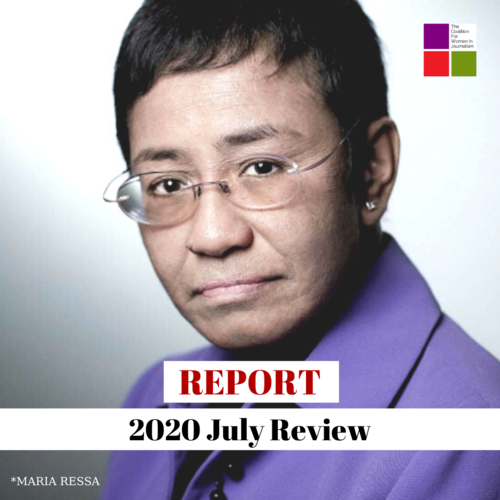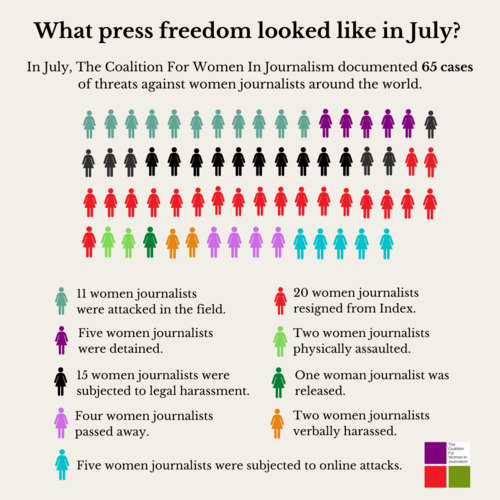What Press Freedom Looked Like in July 2020 For Women Journalists
In July, The Coalition For Women In Journalism documented 65 cases of threats against women journalists around the world.
During the month of July, The Coalition For Women In Journalism documented various cases of threats against women journalists. We identified 65 cases of physical attacks, legal harassments, detainments, arrests and online attacks. We also lost four journalists this month.
11 women journalists were attacked in the field.
11 women journalists around the world were attacked on the ground while reporting vital issues that affect the society.
In the United States, Oregon Public Broadcasting (OPB) general assignment reporter Rebecca Ellis was shot with three projectiles one hitting directly her hand, knocking her camera to the ground. Read more here.
Student journalist Eddy Binford-Ross was hit with tear gas and had a projectile gun pointed right at her while covering the protests in Portland on July 18. Read more here.
As protests in Cape Town and surrounding areas demanding larger lands for the indigenous Africans grew, News24 reporter Jenni Evans was hit with rocks and had her phone stolen on July 20. Read more here.
TV8 reporter Viorica Tataru and colleague Andrei Captarenco were manhandled and deprived of their equipment on July 21 while filming the buffer zone in the conflicted area of Transnistria between Moldova and Russia. Read more here.
In Turkey, Mesopotamia News Agency Dersim correspondent Ayşe Sürme and Jinnews reporter Öznur Değer were subjected to physical violence late at night on July 16, while filming a fight between family members in the central district. Read more here.
During the protests that broke out on July 8, 11 journalists were attacked in the capital city of Serbia, Belgrade. Three of them were women. N1 reporter Jelena Zorić was teargassed and her crew was pushed by plainclothes police as they reported on police beating peaceful protesters sitting in a park in central Belgrade. Nova.rs journalists Milica Božinović and Nataša Latković were attacked by riot police while reporting on the protests on July 8th. Read more here.
Gato Encerrado News reporter Julia Gavarrete reported that her house was broken into and her computer stolen.The suspicious attack towards her home happened when she was at a press conference on July 8. Julia is known to be critical of the government. Read more here.
Hong Kong police charged at demonstrators gathered to hold the annual July 1 March. Among those affected by tear gas was multimedia journalist Chermaine Lee, who was covering the march on behalf of CNN. Read more here.
While five women journalists were detained, 15 women journalists were subjected to legal harassment.
Governments still use legal tactics to silence women journalists. Five of them were detained in July just because of their news coverage. We documented each case here.
Rappler founder Maria Ressa sent the prosecutor today an 18-page affidavit concerning the second cyber libel complaint filed by businessman Wilfredo Keng. Read more here.
More than 1000 days after prominent journalist Daphne Caruana Galizia’s assassination, there has been a new twist in the trial of the men accused of murder. Read more here.
Maria Ressa, one of the Philippines’ most prominent journalists, has appeared before court today giving her statement about tax evasion charges in a case she has described as a form of harassment. Read more here.
The Balkan Investigative Reporting Network (BIRN) in Kosovo and its country director Jeta Xharra have been slapped with a defamation lawsuit by Dhurata Hoxha, a former Democratic Party of Kosovo’s (PDK) Minister of European Integration on July 3. Read more here.
On July 3rd, Rana Ayyub took to twitter to report the various death and rape threats she has been receiving since her coverage on Kashmir. The threats began after she spoke out against the recent killing of Bashir Ahmed Khan, a 65-year-old Srinagar resident, who was caught in the crossfire between militants and security personnel in Kashmir’s Sopore region. Read more here.
On July 14, Mesopotamia Women Journalists Platform Spokesperson and JinNews editor Ayşe Güney was detained during a raid at her house. The raid was part of an operation conducted in Diyarbakır and Gaziantep towards women's organizations in the region. 19 women rights’ activists have been detained during the operations. Police also secretly took photos of Güney and her colleagues in her house. Read more here.
Blogger Amna El Sharqi received a sentence of 6 months in prison and 2000 Tunisian dinars (650 USD) fine for charges on violating sanctities and calling for hatred between religions and races on July 14. Read more here.
Manager of the Mides-Niger website and editor of Niger Search, Samira Sabou was arrested on June 10th following a summons that was issued in response to a defamation complaint filed. She was fined with one million francs on July 17. Read more here.
JinNews reporter Kibriye Evren’s trial on charges of “membership to a terrorist organization” and “propagandizing a terrorist organization” was held on July 14 before Diyarbakır 5th High Criminal Court. Read more here.
27 people including Etkin News Agency (ETHA) reporter and translator Meşale Tolu had their 12th hearing at the İstanbul 29th Heavy Penal Court on July 14, the session was adjourned to February. Read more here.
Artı TV Ankara correspondent Sibel Hürtaş wrote an article on July 6 detailing her brutal detention last week while following the bar association protest. Read more here.
The second hearing of the trial of Ruken Demir took place on July 7. Mesopotamia Agency İzmir correspondent Ruken Demir was first detained on November 12. Read more here.
The 19th session of the hearings of “KCK Press Case” that has been ongoing for more than 8 years was held on July 2 in Istanbul. Nevin Erdemir and Semiha Alankuş were among the prosecuted. Read more here.
Another hearing of journalists Duygu Güvenç and Alican Uludağ was held on July 2nd at Istanbul 2nd Criminal Court of First Instance. They are being charged with disseminating private state information. Read more here.
We also condemn the workplace intimidation and retaliation five NY1 anchors have been facing following the lawsuit they filed last June on grounds of gender and age discrimination they faced at the network. The lawsuit claimed that all five women with experience in the profession have been “blatantly marginalized” and “cast aside” in favor of younger and less experienced women and men. Read more here.
20 women journalists, were among 70 journalists who resigned from Index, in Hungary.
More than 70 editorial staff members, 20 of them women, walked out of the Index headquarters on Friday, July 24 in mass resignation to protest the arbitrary dismissal of their editor-in-chief Szabolcs Dull. The decision was taken by the president of the board of Index.hu, László Bodolai.
Index had expressed concern about their independence a few months ago when Miklos Vaszily, a pro-Orban businessman, bought 50% of shares of Index's advertising and revenue. It was then that the team under Szabolcs moved their status as “in danger” from “independent” in their “press freedom barometer”. Read our statement here.
Two women journalists were physically assaulted.
TVA journalist Kariane Bourassa was covering an anti-mask demonstration on July 26, when she was physically harassed and intimidated. Demonstrators hugged her without her consent and put her health at risk. Read more here.
Sidra Ghias, a Lahore based Samaa TV reporter, was physically assaulted by a group of armed hooligans in Lahore on July 29. Read more here.
One woman journalist was released.
Journalist Yasmeen Saeid was released on a 5000 L.E approximately (350 $) bail. On July 5, Yasmeen was abducted and spent 9 days in enforced disappearance before being interrogated by the General Prosecution office in Alexandria. Yasmeen is now facing charges of creating fake social media accounts to disrupt public order and endanger society's safety and security by spreading rumors and fake news. Read more here.
Two women journalists were verbally harassed.
Brussels based journalist Tanja Milevska took to twitter on July 13 exposing the threats and harassment she has faced online following her coverage of the election campaign in North Macedonia. Read more here.
Sidra Ghias, a Lahore based Samaa TV reporter, was verbally harassed and physically assaulted by a group of armed hooligans in Lahore on July 29. Read more here.
Five women journalists were subjected to online attacks.
With the rise of social media’s impact on politics and global issues, women journalists around the world find themselves tackling one more threat: online harassment.
The latest example of the attack was seen in the case of Al Jazeera Arabic’s senior presenters Ghada Oueiss and Ola Al-Fares. On July 2, Ghada and Ola’s phones were hacked by Saudi trolls and their private pictures were released with profanities. Read more here.
Over the weekend of July 2, journalist and author Leta Hong Fincher has been on the radar of a trolling campaign over her tweets on the mass sterilization of Uyghur and other Muslim women in Xinjiang. Read more here.
On July 10th, Freelance journalist and co-founder of online media outlet Zaborona, Katerina Sergatskova has been a target of an online harassment campaign following her coverage exposing alleged links between Facebook, a local fact-checking organisation called StopFake, and far-right or neo-nazi groups. The online harrasment campaign forced Katerina to flee her home. Read more here.
Two Azerbaijani Sevinç Vaqifqizi, and Fatima Mövlanlı were among the many journalists who reported the protests independently and impartially. For this, they were targeted on July 15th through a Facebook account. The post involved profanities and calls to violence: “These inglorious journalists do not deserve any fruit of these lands! Know about these inglorious who have taken advantage of the call for mobilization for Karabakh and profiteered Armenians. Wherever you see these journalists, slap them with courage. Hit them, know the enemy within!” Read more here.
Four women journalists passed away.
The world of journalism lost four women reporters in the month of July. The Coalition For Women In Journalism pays them respect.
Good Morning America producer Daisha Riley passed at age 35 on July 22.
CBS reporter Nina Kapur passed on July 20 following a motorcycle accident. She was 26 years old.
Veteran journalist Jo Tuckman passed on July 10 in her Mexico home. She was the author of the book “Mexico: Democracy interrupted”.
24 years old Indian TV anchor Priya Juneja was found dead in her New Delhi home on July 31.
If you would like to request more insight into our findings, or would like to suggest an addition to our work reach out to us at data@womeninjournalism.org. For media inquiries reach out to us at press@womeninjournalism.org.

